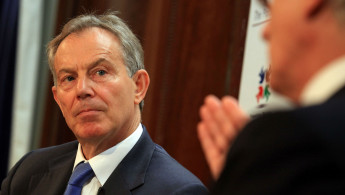Blair "a mistake" as Middle East Peace Envoy
Following a report in the Financial Times that the former British prime minister was to "step back" from his position as Middle East Peace Envoy, top officials and diplomats are revealing what they really think of Tony Blair.
Blair had achieved "very, very little" and should never have been given the role, the former British ambassador to Libya said this morning.
Oliver Miles said in a scathing interview on BBC Radio 4's Today programme that "he's not been able to do the job. I think it's the wrong man and I also think it's the wrong job".
Blair was appointed to the role of Special Envoy with the Quartet on the Middle East in 2007 by the former US Secretary of State Condoleeza Rice on the day he resigned as British prime minister.
The Quartet consists of the US, Russia, the EU and UN, and was formed in 2002 as a follow-up to the 1991 Madrid Conference to help negotiate a Palestinian-Israeli peace.
Some diplomats said that Blair was being "eased out" because he was seen as ineffective, according to the FT article. His twin occupations as high-flying diplomat and businessman with multiple international interests were also concerning to Washington officials, it said.
A former US government official has also told The Daily Telegraph that Blair "has no credibility" in the region, while another diplomat said that the Obama administration was privately critical of Blair even while describing him in public as a "valued partner" for peace.
Blair is said to have told friends last week that he wished to "reconfigure" his role and was tired of being blamed for the Quartet's shortcomings. But with regard to the idea that Blair's role may be "widened" or "reconfigured", Miles, the former Libya envoy, told the BBC that this would be a "mistake".
If Blair had been supported by members of the Quartet in this role for the past eight years, and if he were to be supported in any future international role, this was because he provided them with a "convenient excuse for doing nothing", he said.
The appointment struck Miles as "strange" from the beginning. "I am told he has achieved something in his limited role of trying to help the Palestinians develop their economy. But that's all."
But isn't this at least something of an achievement? "One talks about developing the Palestinian economy, but you'll have seen pictures of Gaza - the place is a ruin," said Miles.
Miles suggested that Blair did not even achieve the limited tasks he was set of helping to develop the Palestinian economy and of encouraging the rule of law: "When have we heard him speaking about illegal settlements? When have we heard him speaking about the separation wall, which was unanimously declared to be illegal by the International Court [of Justice]?"
Even the Quartet was not spared by Miles: "The Quartet has acheived nothing and Tony Blair as its representative has achieved very, very little.
"I'm an old fashioned diplomat and I believe in the United Nations," he continued. "I'm not convinced that the Quartet structure itself is the best one because it's a very strange body."
However, he agreed that there should be a peace envoy, and that they should not be an American. "The Americans... since 1967 or 1948 have proved that they're unable to do the job, because Congress won't let them."
Miles, along with another former British ambassador, Sir Richard Dalton, and other prominent figures, including former Mayor of London Sir Ken Livingstone, human rights barrister Michael Mansfield and politician George Galloway, signed an open letter last summer calling for Blair to be stripped of his position.
He was accused of not taking enough responsibility for the war in Iraq, for ineffectuality in the Palestinian-Israeli peace process and for holding his position despite conflicts of interest, as his consulting business expanded across the Middle East, advising banks and autocratic regimes alike.





 Follow the Middle East's top stories in English at The New Arab on Google News
Follow the Middle East's top stories in English at The New Arab on Google News


